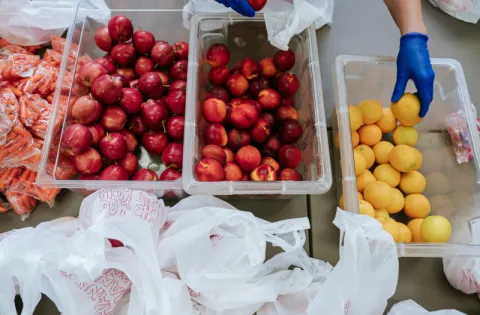
Today, No Kid Hungry Senior Vice President Lisa Davis was on Capitol Hill testifying in front of the House Agriculture Committee Subcommittee on Nutrition, Oversight, and Department Operations about Broad-Based Categorical Eligibility for SNAP households.
Part of our work to make sure kids get the food they need every day is working with elected officials and government agencies to strengthen and improve the federal nutrition programs that feed kids.
Read more about the important role Broad-Based Categorical Eligibility plays in helping low-income families with kids.
Oral Statement for House Nutrition Subcommittee Hearing on Broad-Based Categorical Eligibility in SNAP, June 20, 2019
Thank you for the opportunity to join you to discuss Broad-Based Categorical Eligibility and the important role it plays in helping working poor families with children. My name is Lisa Davis and I am the Senior Vice President of Share Our Strength’s No Kid Hungry Campaign.
Share Our Strength’s mission is to end hunger and poverty in the United States and abroad. Through our No Kid Hungry campaign, we help connect low-income children and families to the federal nutrition programs for which they are eligible and advocate to strengthen policies to end childhood hunger.
Broad-Based Categorical Eligibility is an effective, practical policy that that helps low-income working families move out of poverty and build financial security. I urge you to continue to resist efforts to reduce or eliminate it.
SNAP is our nation’s most effective child nutrition program. A robust body of research reinforces SNAP’s positive impact. It reduces food insecurity and deep poverty and improves children’s health, education outcomes and even lifetime earnings. Indeed, SNAP is an investment with an ROI that any corporate executive would envy.
The three most important things I’d like to get across about Broad-Based Categorical Eligibility today are: that it primarily helps working poor families with high living expenses, it is not an automatic pathway to SNAP benefits and it has a marginal impact on SNAP costs and caseloads.
By allowing states to align SNAP income eligibility and asset limits with the rules they use in the Temporary Assistance for Needy Families (TANF) block grant, Broad-Based categorical eligibility strengthens access to both SNAP and free school meals for low-wage families with children. It allows them to accumulate modest assets to weather an unexpected financial crisis and it softens the benefit cliff they face as their incomes increase.
Let me give you an example: A single mother with two children who works full-time and earns $12.50 an hour has an income at about 125% of poverty and could receive about $161 per month in SNAP. Without Broad Based Categorical Eligibility, if her wages increased by only 50 cents an hour, her income would rise above 130% of poverty and her family would become ineligible for SNAP, losing about $75 per month in net resources.
My second point: while Broad-Based Categorical Eligibility conveys SNAP eligibility to households with gross incomes modestly above 130% of the poverty line, it is not an automatic pathway to SNAP benefits. Families must still apply and qualify for benefits through the regular application process which has rigorous procedures for documenting income and circumstances. Families can be categorically eligible for SNAP but unable to receive a benefit because their net income after deductions is too high.
Finally, Broad-Based Categorical Eligibility has a marginal impact on SNAP participation and costs. In a study earlier this year, the Congressional Research Service determined that only 4.2%, of SNAP households had gross income within the Broad-Based Categorical Eligibility range of 131% and 200% of poverty. And studies show that only 0.2% of SNAP benefits go to households with net incomes above the poverty line.
In a nation where more than 12 million children live in families that struggle with food insecurity, Broad Based Categorical Eligibility plays an important role in making sure children have access to the nutrition they need to grow up healthy and strong both at home through the SNAP program and at school through the free breakfast and lunch programs.
The access to free school meals because of their families’ receipt of SNAP is important; even the reduced-price cost of school meals can add up, particularly for families with multiple children.
As part of my job, I frequently meet with families living with food and financial insecurity. The moms and dads I meet are working incredibly hard to better their lives and those of their children. Often, they hold down multiple jobs, cut expenses to the bone and still find it nearly impossible to stretch their paychecks to make ends meet.
One unforseen expense, like a car repair or a medical bill can set them back for months or even years.
I would like to leave you with one final thought: Broad-Based Categorical Eligibility is working exactly as intended - It encourages and supports work, and helps low-income families build financial stability and move toward self-sufficiency. These are goals that we can all agree on.
Thank you.


